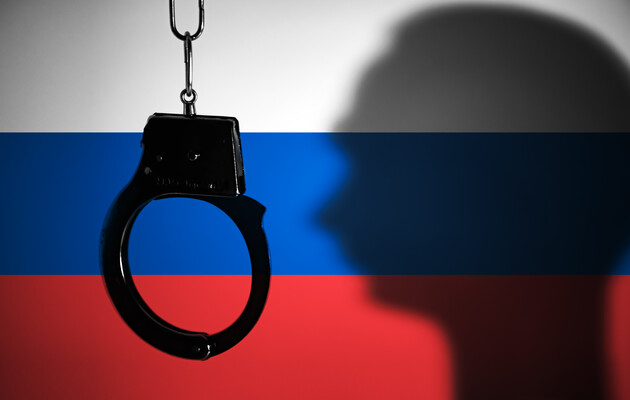Experts explained what the Kremlin can do if someone dares to execute the ISS warrant.

A week has passed since Russian President Vladimir Putin became a world criminal. The International Criminal Court (ICC) issued a warrant for his arreston March 17, accusing him of committing war crimes during the full-scale invasion of Ukraine. Since then, some of the court's member states have weighed whether they would detain and bring Putin to court in The Hague.
It is not known whether Putin will ever be held fully responsible for orchestrating the illegal deportation of Ukrainian children. However, if he enters the territory of the member states of the ICC, they are legally obliged to execute the arrest warrants for Putin and Maria Lvova-Belova, the Russian President's Commissioner for Children's Rights.
But this may not be the only risk for Putin after the issuance of an arrest warrant, as he also faces humiliation, disgrace or even death at the hands of enemies both inside and outside the country, writes Newsweek.
All The ICC countries, which include all EU members, most African states, all Latin American states except Cuba and Nicaragua, and even Tajikistan, are legally bound to arrest Putin if he ever sets foot on their territory, the Center for European Policy Analysis notes ( CEPA).
The ICC has no police of its own to execute its arrest warrants and depends on 123 member states to assist it. Although this has not always worked in the past. In 2009 and 2010, the ICC issued two arrest warrants for former Sudanese leader Omar al-Bashir. Despite the fact that since then he has visited member states of the International Criminal Court, he is still at large.
Read also: The State Duma is considering how to “revenge” the International Criminal Court for the warrant for Putin – they propose to ban the operation of the court in Russia
While several NATO countries, including Germany and the United States, have reaffirmed their commitment to comply with an ICC warrant for Putin's arrest, Hungary, which is also a member of the alliance, has announced that it will not arrest the Russian president if he enters the country.
Gergely Gulyash, Hungarian Prime Minister Viktor Orbán's chief of staff, said on March 23 that although his country signed the Rome Statute and ratified it in 2001, there is no basis in Hungarian law for Putin's arrest. The announcement came after former Russian President Dmitry Medvedev warned that any attempt to arrest Putin on an ICC warrant would be tantamount to declaring war on Russia.
There is also growing debate over whether the Russian autocrat could be arrested in August this year during the expected trip to the summit of the BRICS countries, which will be held in South Africa. After all, the African country is also obliged to execute the arrest warrant.
Putin's enemies inside?
Vlad Mykhnenko, an expert on the post-communist transformation of Eastern Europe and the former Soviet Union at the University of Oxford, told Newsweek that he believed Putin could be arrested and put on trial in The Hague if he was removed from power, or if Russian elites arrange his arrest for the purpose of overthrow.
“Since the Kremlin, firstly, is paranoidly afraid for Putin's safety, and secondly, believes that the USA rules the world, Putin will not set foot on the territory of a member state of the ISS to avoid any problems,” Mykhnenko said, adding, that Putin most likely will not risk going to Dushanbe in Tajikistan or to South Africa.
Also read: South Africa seeks ways to avoid executing Putin's arrest warrant – Bloomberg
A if Putin nevertheless risks visiting the ISS countries and “gets into trouble”, this may be the result of the “security forces” arranging his arrest “in order to get rid of him”, Mykhnenko said.
“It was possible it would be easy to find a replacement who would even promise to “take revenge” for the loss of the dear leader, but only for a tick,” he said.
Boris Bondarev, a former Russian diplomat who publicly resigned over the invasion of Ukraine last year, also said in an interview with Newsweek last month that Putin could be replaced and that he might be forced to resign if he loses the war against Ukraine .
“Putin can be replaced. He's not a superhero. He has no superpowers. He is an ordinary dictator,” said Bondarev.
Mykhnenko drew a comparison with Slobodan Milosevic, who was indicted by the International Criminal Tribunal for the former Yugoslavia in 1999.
“After he lost power in the country, the new Serbian leader to restore relations with the West , transferred Milosevic to the tribunal in The Hague. I think that the post-Putin leaders could repeat this trick to restore relations with the West,” Mykhnenko said.
However, under such a scenario, Putin may not even get to The Hague.
“Given Putin's extensive connections across Europe and the fact that he can potentially tell judges about corruption and dishonest dealings between Moscow and major Western capitals, there will be plenty of incentives to silence him even before The Hague,” the expert believes.
In addition to the risk of being betrayed by the Russian elite, Putin can run into trouble simply by visiting other countries, even if they are friendly to the Russian regime and do not seek his arrest, as in the case of Milosevic.
Read also: FT: Xi Jinping invited Putin to China, against the backdrop of an arrest warrant from the ISS, this means something
Former British Prime Minister Tony Blair has faced at least five instances of members of the public trying to place him under “civil arrest” for alleged war crimes during the 2003 invasion of Iraq. The last documented incident was in 2014, when Twiggy Garcia, a barman in east London, put his hand on Blair's shoulder and told him he was carrying out a civil arrest because he had launched an “unprovoked war on Iraq”. Garcia asked Blair to walk with him to the police station. Blair refused and tried to prove his point before Garcia left. Blair, who claims the invasion of Iraq was justified, has never been charged by the ICC with any crime.
Similarly, in 2001, activist Peter Tatchell attempted to have Zimbabwean President Robert Mugabe under civil arrest in Brussels for human rights abuses. Mugabe's bodyguards attacked him and beat him unconscious. Mugabe was never charged by the ICC with any crime and died in 2019.
Mykhnenko noted that the arrest warrant issued by the ICC made Putin “extremely vulnerable” and “humiliated” in Russia itself.< /p>
“That is why the Kremlin television has become very quiet. “They don't want ordinary Russians to hear the words 'Putin', 'arrest', 'warrant' in the same sentence, because it destroys his charisma as a 'bad guy' and makes him look like a simple criminal, a despot from third world countries,” he said. he.
What could be Russia's response?
Threats by Medvedev, who holds the position of deputy chairman of Russia's Security Council, about the possible arrest of Putin caused alarm. He stated that if the German authorities try to arrest the Russian president on the warrant of the ICC, it will be a declaration of war. Germany belongs to NATO member countries along with the USA. Therefore, Medvedev's threats mean that any arrest will lead to an alliance war with Russia, which will trigger World War III.
Rabea Boenighausen, a spokeswoman for Germany's Federal Ministry of Justice, told Newsweek that “Germany, like all ICC states, is obliged to cooperate with the ICC (and therefore to execute an arrest warrant) under Article 86 of the Rome Statute and Section 2 (1) of the Law on Cooperation with the International Criminal Court”.
Olga Lautman, a senior fellow at CEPA and senior research fellow at the Institute for European Integrity, noted that Medvedev and other Kremlin officials and propagandists have repeatedly threatened ICC member states if they comply with Putin's arrest warrant, but those threats are likely to remain are empty.
Also read: Hungary blocks EU joint statement on international arrest warrant for Putin – Bloomberg
“In the hypothetical case that Putin is arrested by a member of the ICC, I do not believe that Russia will do something,” she said in an interview with Newsweek, adding that it may depend on the member state and what leverage Russia may have on it.
“When it comes to Germany or any NATO country, Russia will not take any action because they fully understand that they are not ready for a direct confrontation with NATO,” she said in an interview with Newsweek.
Lautman said Russia could put pressure on signatories in Africa and other countries outside NATO to get them to renege.
She added: “Putin personally is a coward and I don't believe that he dares to go outside of Russia, risking being arrested.”
Lautman's sentiment was echoed by Alexander Moskalenko, a democracy fellow at CEPA, who told Newsweek that Medvedev's “tantrum” “has no legal basis.”
“It's like threatening a police officer who has been ordered deliver a person to a court hearing. There is nothing personal in the actions of the state in this case – it received an order, it is obliged to cooperate, and it is cooperating,” said Moskalenko.
He explained that if Russia does not agree with the warrant, it should go to the ICC, although there is no legal mechanism to cancel this warrant.
Also read: I believe that issuing a warrant for Putin's arrest will lead to bad political consequences – Vucich
“Such a mechanism exists, if the arrest warrant was issued by another state, then the case can be initiated in the UN International Court of Justice (as was the case in the case of Congo against Belgium). But the UN IC examines cases only when the parties are states, and the ICC is definitely not a state,” he noted.
Moskalenko said that Putin's arrest “probably will not lead to a wider war.” “although this issue is not legal, but political.”
Related video
“Many wars were started without any reason. I think that if the president of Russia is arrested in the Netherlands, he will not be physically able to participate in the routine procedures related to the declaration of war. Moreover, any action against a NATO country means a joint response from NATO,” the expert noted, adding that Russia “is not able to cope even with Ukraine, let alone NATO.”



